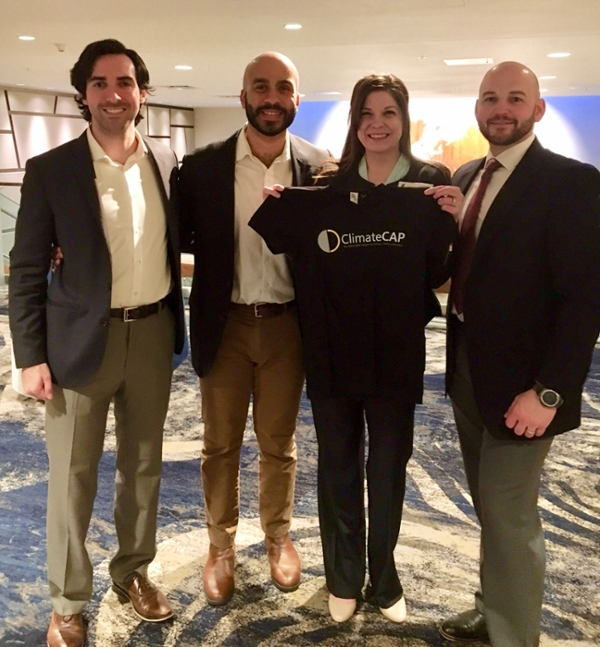The Ray C. Anderson Center for Sustainable Business at Georgia Tech Scheller College of Business (“Center”) recently sent four students to ClimateCAP: The Global MBA Summit on Climate, Capital, & Business. The conference for MBA students who want to be the most forward-thinking leaders of their generation was held March 23-24, in Durham, North Carolina. The Center partnered with Duke’s Fuqua School of Business in sponsoring the conference, along with other top-tier business programs including Harvard Business School, the Stanford Graduate School of Business, the Wharton School, and the Yale School of Management.
To support the Center’s strategic goal to deepen students’ engagement in sustainability topics, small grants for conference registration and travel were awarded to Naveed Ahmad (MBA 2019), Braden Beaudreau (MBA 2020), Samuel N. Jerome (MBA 2019), and Hannah Tripp (MBA 2018). Industry leaders from firms including JPMorgan Chase, Goldman Sachs, Nike, Morgan Stanley, and Levi Strauss engaged participants in conversations about the business implications of climate change—both risks and opportunities. In addition to presentations from practitioners and scientists, the conference also included a networking reception, resource reports and takeaway materials, and brainstorming sessions with MBAs and industry executives.
The Scheller College attendees said the conference expanded the breadth and depth of their knowledge about how climate change would impact their future careers. The topic was a natural fit for some MBA students’ interests. Ahmad, for instance, remarked, “One of the primary reasons why I came to business school was to learn how to solve tough problems around climate change through the lens of business. The fact that this conference focused on seeing climate change as a business problem—and not necessarily as an environmental or ethical problem—is really what caught my attention.”
Praise for the summit also came from Jerome, who noted that it broadened his perspective on how “sustainability is not only important for our future but also profitable for businesses.” Beaudreau, also a 2017-18 Scheller College Sustainability Fellow, found the bottom-line arguments convincing as well, particularly in regard to changing standards regarding sustainability and investment. A panel of venture capitalists, for example, touched on the risks of not being sustainable, with one panelist reporting “how companies that are not sustainable are discounted—because a lack of sustainability will incur hidden costs later.”
Organizers made clear that the conference was intended not just for those MBA students interested in sustainability-focused careers in business. They emphasized how every MBA student should be informed about climate change. With 42 percent of Fortune 500 companies having set goals for carbon reduction and investors expecting companies to report their climate risk to shareholders, climate change’s relevance to business is growing steadily. The inclusivity of the summit resonated with Tripp, who attended, she said, “mostly because of my ignorance in the area of climate risk and sustainable business approaches. I can read cases in class, formulate solutions and business plans, and write an excellent paper, but at work with ‘real-life’ situations, my business cases for sustainable initiatives are never quite enough.” In order to help her nudge sustainability up on the list of priorities for an organization, she said she attended ClimateCAP “to buff-up my knowledge and expertise about potential risks and opportunities to be more persuasive.”
Following this first successful year of ClimateCAP in Durham, the conference will rotate annually between the 16 different business schools that form the consortium. The conference’s broad appeal to MBA students with different career paths in mind will help future leaders weave environmental sustainability goals throughout their organizations. As Beaudreau noted, the “inspiring” weekend reminded him “to keep sustainability in mind in whatever company or field I end up!”
